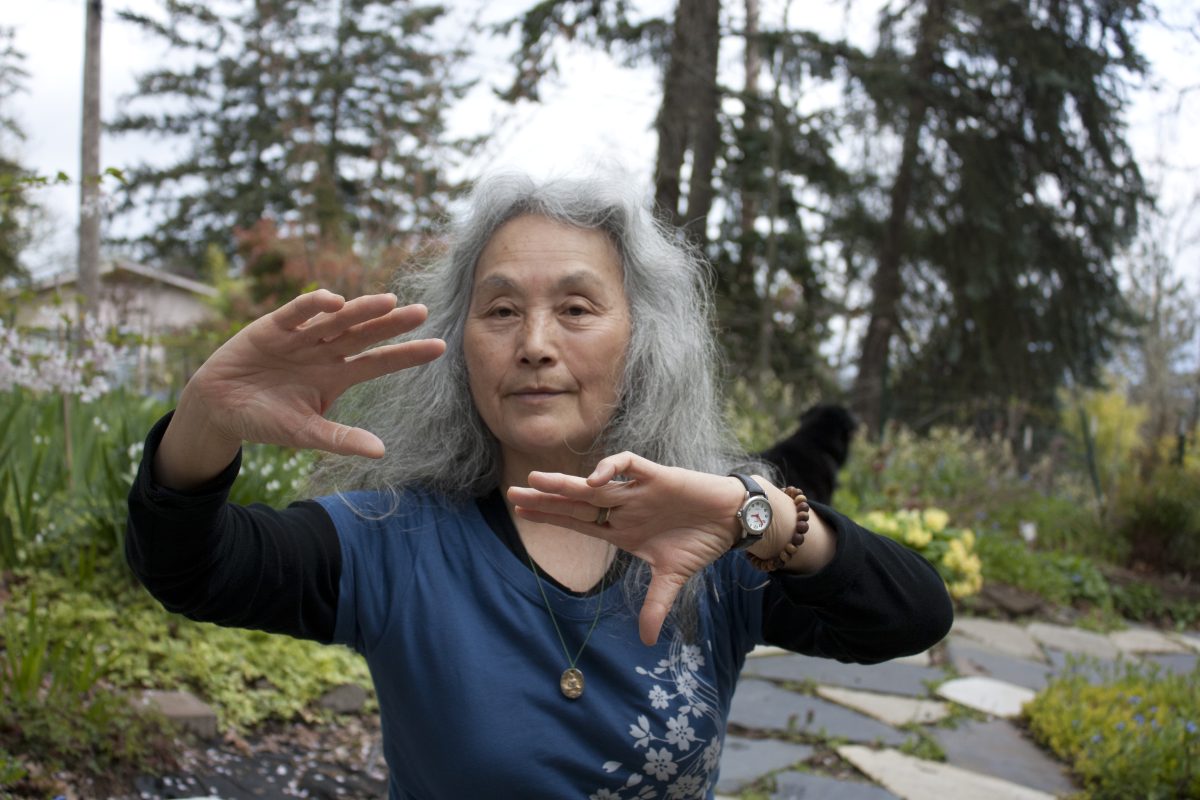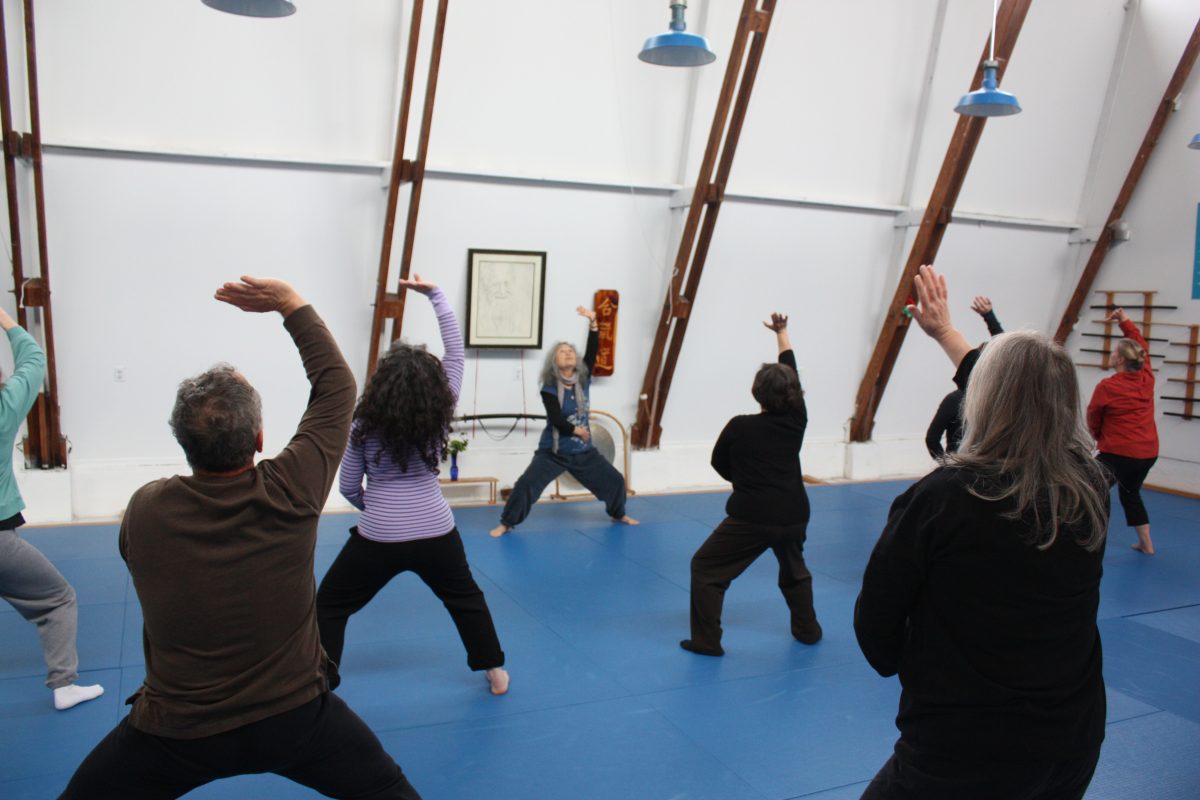Story and Photos by Spencer Adrian
In the backyard of her quaint Eugene home, Machiko Shirai can often be found tending to her garden under the pink blossoms of a cherry tree. At first glance, her long salt and pepper hair and small stature is not very intimidating. Few would expect that she is an expert in martial arts and is trained in weapons from swords to a paper fan. Shirai is a master of Chen style tai chi, a martial art that focuses in slow movements that are powerful, yet peaceful.
On some mornings, as the sun is just coming up, she does standing meditation. She faces the direction of the sun and practices Qi Gong, where she gathers chi from the universe. Chi is a Taoist term described as a life force that lies in all things. Shirai’s life is slower than most; she has no cell phone, no television, and no computer, but that’s the way she likes it.
Shirai grew up in Kobe, Japan. Before she found tai chi, she lived a very typical life. It was a little over 25 years ago after attending her first tai chi class with her sister that she decided to head in a more spiritual direction.
“I was so fascinated,” Shirai says, “I really wanted to do more, and I practiced tai chi every day.”
Shirai explains that many people in the Japanese culture were doing Jazzercise and aerobics at the time. Tai chi had come over from China, and few people were learning about this slow moving form of martial arts.
Tai Chi, or t’ai chi ch’uan, translates to “supreme ultimate fist” and has been practiced for centuries in many different styles and forms. At first, Shirai learned Yang style tai chi from Master Terumi Ueshima in Kobe, but she knew that she wanted to study Chen. As one of the oldest forms of tai chi, Chen is practiced mostly by young men. It is a style that focuses a lot on Fa Chin or “explode force”.
Chen is a style that is very different from the slow beautiful movements of Yang. Chen and Yang are two of the five traditional styles of tai chi. Wu/Hao, Wu, and Sun are the three other oldest styles. There are countless modern styles that are created by different masters mixing their own style with the styles of those before them.
While Shirai learned tai chi, she held a job teaching English to Japanese students. Shirai simultaneously balanced her job and three tai chi classes while raising her daughter, Kumiko. Shirai always found a way to make things work and brought her dedication to tai chi into everyday activities.
Many tai chi movements require the body to squat and move with legs bent. In order to gain strength for tai chi, Shirai rode a bike to some of her classes, which she says was uncommon at the time.
“I just wanted to be stronger. I wanted to have enough strength to practice Chen,” Shirai says.
Shirai’s dedication eventually paid off. In 1992 her sensei, Nobuyuki Hayashi, chose her and three others out of hundreds of students to visit Chen village to see the birthplace of Chen style tai chi. Shirai then studied under Grandmaster Wang Xian in Chen village. He is the only master that still lives in the birthplace of Chen tai chi. Shirai says that many people learn from various masters and try to combine the styles, but she believes in honoring one true master, and not learning from others.
“Wang Xian is my master. I will stick to him forever,” Shirai says.
Shirai is also trained in Wooden, a traditional style tai chi sword and the tai chi fan. She often practices these styles in her back yard, on a stone pathway that her students helped build. While tai chi is a slow moving meditation, it is also a martial art that can be used as self-defense. Different moves that she practices look very slow and graceful, but in others, she can stomp her foot and shake an entire gym floor. She is always in balance with yin and yang, the two opposing forces of life.
Shirai currently teaches tai chi in Eugene. She came to the US in 1994 and studied linguistics at UO, receiving a masters degree in linguistics from Oregon State University in 1998. After seeing the way that many students were stressed out, Shirai decided to teach tai chi at Lane Community College. Shirai taught there for five years before coming to teach at UO.
“I teach tai chi in a therapeutic, spiritual, medicinal way,” Shirai says, “Students come to me and are stressed out or sick, but when they do tai chi, they feel better.”
Shirai also teaches classes to the elderly as a way to keep them healthy as they go into their older years. Tai chi has proven beneficial for things like balance, lowering blood pressure, arthritis benefits, and lowering the effects of Parkinson’s, Alzheimer’s, and ADHD. Aside from her classes at UO, she teaches at the Hai Ki Aiki Center in Eugene, and does one-on-one lessons as well. Shirai’s students range from college age up to senior years, and her oldest student is set to turn 93 this year.
At first, Shirai was in the United States on a work visa, but when it expired she faced many hurdles to get her green card for permanent residence. Lawyers were out of her budget, and she could not go through the application process by herself. Shirai faced being forced to return to Japan if a solution could not be reached.
Shrai’s impact on her students and the community was so great that they rallied together and raised money to pay for her lawyers. Both Senator Gordon Smith and House Representative Peter Defazio rallied around her cause as well, adding letters of support to her application. It wasn’t long before the application process had gone through, and Shirai was granted a green card and permanent residency in the US.
“I was so honored. I have to pay back my community. They helped me so much,” Shirai says.
Shirai has been paying back the community through teaching tai chi ever since. She believes that tai chi helps people stay healthy and is an easy way to relieve stress and the problems from everyday life. She often holds community lessons and demonstrations so that everyone may benefit from tai chi.
As a testament to the health benefits of tai chi, Shirai hasn’t been to a doctor for more than a checkup in over 20 years. If she is really sick, she has her daughter Kumiko, a licensed acupuncturist and herbalist in Portland, come down and heal her using traditional Chinese medicine.
“Tai chi can cure anything,” Shirai says, “When you have a headache or don’t feel good, you do tai chi and you will feel better.”
In order to teach tai chi to a wider audience, Shirai wrote and published her own book, Every Day 10 Minutes, The Simple Way to Balance Your Mind and Body. Shirai has sold more than 200 copies and hopes that people will put her book on their coffee table at home as a reminder that tai chi only takes ten minutes a day.
As a practicing Taoist, Shirai strives to live a humble life. She stays away from most technology, only playing calming music on a small CD player in her home. She only drives if she has to, and does not use modern technology like email or cell phones. She doesn’t wear makeup and is not concerned about her appearance. She is happy with what she has, and lives a very traditional lifestyle amid the fast–paced world of today.
“Your heath is always more important than beauty,” Shirai says.
On top of practicing tai chi, Shirai practices qigong, a form of moving meditation that brings her chi from the universe. By raising her hands and arms, Shirai gathers chi to cleanse her body. She then gives it back to Mother Earth, the being that Taoists believe gave us life and a place to live. Qigong is a practice that gives her energy and good chi.
“Many people think only the pretty and beautiful things give you chi, but everything has chi. Storms, thunder, the entire universe has chi,” Shirai explains.
Shirai hosts tai chi classes every day. People of all ages come and learn about health and Chinese history. As she teaches her final class of the evening, her students are completely silent except for the resetting of their feet on the ground. Everyone is perfectly in sync as they perform a standard Chen style tai chi routine.
“Let your body memorize the movements,” Shirai says. “Tell yourself, I am happy, grateful, healthy, humble.”
Categories:
The Art of Serenity
May 22, 2012
The Art of Serenity
0
Donate to Ethos
Your donation will support the student journalists of University of Oregon - Ethos. Your contribution will allow us to purchase equipment and cover our annual website hosting costs.









